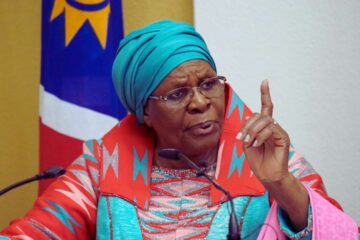Allexer Namundjebo and Erasmus Shalihaxwe
Politicians have supported the establishment of an independent body to investigate crimes committed by police officers and other law enforcement agencies.
They argue that the police cannot be trusted to investigate the offences of officers.
Social activist Michael Amushelelo has reiterated his call for such an institution, emphasising the need for public involvement in selecting its leaders.
“For a very long time, I have called for the immediate establishment of an agency similar to the Federal Bureau of Investigation (FBI): We can call it the Namibia Bureau of Investigations,” he said.
He added that such an institution will investigate all “killings and corruption” within the Namibian Police Force because people can’t trust a criminal to investigate another criminal.
The Landless People’s Movement’s (LPM) youth leader, Duminga Ndala, called the creation of an independent investigative body “legitimate and necessary”.
She argued that the growing number of unresolved cases involving police officers has eroded public trust.
“There is a strong public perception that when high-ranking police officers are involved, their cases often become entangled in bureaucratic delays, with little to no resolution or transparency. This raises serious concerns about accountability and reinforces the belief that police officers receive protection from their ranks,” Ndala said.
Joseph Kauandenge, a former member of Parliament, also voiced his concerns about the issue, highlighting the lack of trust in police officers’ ability to investigate other officers.
“It is, in fact, a mockery of our judicial system that police officers must investigate other police officers, to whom they have ties, and some being their bosses. This is compromising justice delivery to those affected by their conduct,” he said.
Previously, the police had been severely criticised regarding various shootings that resulted in the deaths of civilians, including an incident in 2023, where five men, suspected of an armed robbery, were shot and killed in Okahandja.
Leader of the official opposition in parliament, the Independent Patriots for Change’s Immanuel Nashinge, agreed that such a body is long overdue.
“In a democratic country, oversight bodies that investigate police and security agencies are important because they guarantee accountability, transparency, and public trust in law enforcement. Without them, unchecked power leads to abuse, corruption, and loss of legitimacy,” Nashinge said.
Popular Democratic Movement (PDM) member Maximilliant Katjimune supported the call, stating that the police cannot investigate itself due to inherent conflicts of interest.
“There should be a body that investigates allegations levelled against members of the police and their operations,” he said.
The Affirmative Repositioning (AR) Movement in Ohangwena Region has condemned what it calls a persistent pattern of police brutality and extrajudicial killings, following the fatal shooting of 38-year-old Malakia Shilongo at the Onhuno roadblock on Sunday night.
Shilongo, a co-driver of a Scania truck, was reportedly shot in the stomach by a police officer during a routine checkpoint stop.
Police allege that Shilongo became argumentative and later drove the truck toward a female officer, prompting a male officer to open fire.
The Ohangwena Magistrate’s Court will hear a 43-year-old suspect, Dimbulukeveni Namhila, on a murder charge on Wednesday.
The AR’s Ohangwena chairperson and member of parliament, Tuhafeni Kalola, criticised the regional police leadership and the growing militarisation of police-civilian interactions.
“These barbaric acts are not just criminal matters. They reflect a total degeneration of leadership in our regional police department,” Kalola said.
The AR statement listed several unresolved cases involving fatal police-civilian encounters in the region, including the 2020 killing of David Tuhafeni in Oyongo Village and the 2021 death of Lebbeus Wambalili in Onamhinda.
“None of these cases saw justice,” Kalola said. “We are seeing a trend where officers act with impunity, and families are left in grief without closure.”
Kalola called on Inspector General Joseph Shikongo to conduct an urgent review of regional police commanders’ performance, with a focus on officer wellness programs and accountability mechanisms.
“We demand swift and uncompromised justice for Malakia Shilongo. The mere fact that the accused officer was arrested is not enough. We will not relent until justice is served,” Kalola warned.
Shilongo’s mother, Loide Shilomboleni, described him as the family’s breadwinner and expressed the family’s grief, awaiting official explanations.
Photographs from the scene showed multiple bullet holes in the truck, raising questions about the level of force used.
Former member of Parliament Hidipo Hamata, who passed through the roadblock minutes before the incident, has vowed to pursue legal action against the Namibian Police through his lawyer, Norman Tjombe.
“This tragic loss demands more than statements. We need accountability, justice, and reform,” Hamata said.
The police sergeant was denied bail by Magistrate Vennecky Mumbala on Tuesday.
Prosecutor Elina Hashipala objected to bail due to the seriousness of the offence, the early stage of investigations, and the possibility of interference with witnesses.
Magistrate Mumbala postponed the case to June 3 for a formal bail application and further investigations.
Police have refuted the circulating claims linking the officer to previous shootings.




